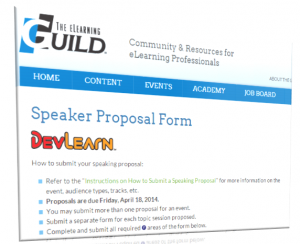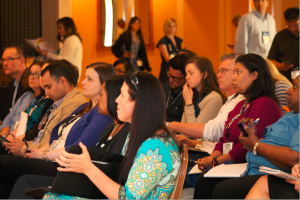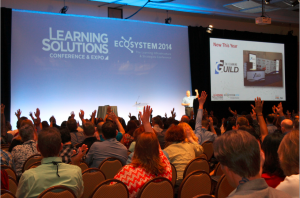Tips for Writing a Winning Conference Proposal
I’ve written a large number of conference proposals for different events over the years, and I’ve also read through close to 2,000 proposals that have been submitted by members of the learning and performance profession. In this post I share some of the tips I’ve learned over the years from writing and vetting speaking proposals. While some of the comments that follow may be eLearning Guild specific, the majority of the tips are easily transferable to any organization you may submit a speaking proposal for.
Understand the Event
 Understanding an event is the foundation upon which a successful proposal is built. Here are some key questions you should be asking yourself before you begin writing a proposal:
Understanding an event is the foundation upon which a successful proposal is built. Here are some key questions you should be asking yourself before you begin writing a proposal:
- What are the themes of the event?
- Who are the attendees? (What types of organizations do they come from, and what positions do they hold?)
- How will your experience and knowledge add value to the event?
Being able to answer these questions before you start to write is critical.
Write for the People Reading Your Proposal
Who is the audience for your conference proposal? Believe it or not, it’s NOT the people who are building the program. Yes, the conference organizers ultimately decide which sessions are added to the program, but they do so by picking sessions that best resonate with those attending the event.
Ultimately the people who you are trying to connect with are those that will read your session description in the conference program. A compelling description is what is going to make attendees want to come to your session, and that’s what makes a session valuable to a conference.
Tell a Story
 A high-quality speaking proposal isn’t just about what information you are going to share, it’s about how you plan to share it. Consider these two brief descriptions of what is essentially the same session:
A high-quality speaking proposal isn’t just about what information you are going to share, it’s about how you plan to share it. Consider these two brief descriptions of what is essentially the same session:
In this session I will explain how to build quality compliance training. I will show you how to analyze the needs of your organization to find our what compliance training needs to address. I will show you how to design engaging compliance learning programs that learners will love. I’ll close the session covering to evaluate compliance training effectively.
This session may be great. It may be sharing useful tips that people can use. As a proposal, it’s very dry and fact-based. Now consider another option for the same session.
Compliance training is a necessary evil that most employees dread having to take. It’s often more about completions than learning. That’s the way it’s always been at ABC Bank, until we decided to do something better. In this session you’ll learn about our efforts to build compliance training program that focused more on behaviors than completions. You’ll understand the challenges we faced, how we overcame them, and the benefit this change has had on our organization.
This description has a much stronger narrative. It tells a story that potential attendees can connect with on both a fact-based and emotional level. Telling a story can make a conference proposal very powerful as it changes the perspective from “I’m an expert telling you how to do your job” to “I’ve been where you are and have felt your pain. Let me share what I learned.”
Telling a story in a conference proposal may seem challenging at first. It can be easier to build the story by answering two basic questions:
- What is the problem you are going to talk about?
- What solution(s) are you presenting to the problem?
Remember… It’s Not About YOU
If you read through the two sample descriptions again, you may notice another subtle, but critical difference: narrative focus. A well-written proposal focuses on the attendee, not on the speaker. The first sample above is littered with “I” statements. Its focus is on the speaker. In the second example, the focus shifts to the attendee, as evidenced by the usage of the word “You”.
Explain How You Will Engage the Audience
 Strong conference sessions are very engaging for attendees. The sessions that I’ve also seen perform well with attendees are ones where attendees are active participants; they are more facilitated discussions than expert-led lectures.
Strong conference sessions are very engaging for attendees. The sessions that I’ve also seen perform well with attendees are ones where attendees are active participants; they are more facilitated discussions than expert-led lectures.
You may naturally engage audiences when you train or speak at events. Make sure your conference proposal reflects that. In the absence of specifically stating how you will engage attendees, you may be implying your session is a straight lecture by default.
Consider Takeaways
What’s the benefit of me attending your session? Specifically, what will I get out of attending your session that I can use in my work?
A well-written conference proposal must answer these questions. Many conference proposals will specifically ask for statements (or objectives) of what people will learn from the session. These are very important parts of the proposal, as they play a big part in attendees deciding to attend your session. Even if the proposal form doesn’t specifically ask for statements like this, you should provide them.
These are just a few tips, and in the future I’ll share some more. If you have some tips you would like to share, I’d love to hear them and have you share them with our readers by adding a comment to this post.

Leave a Reply